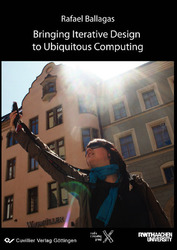| Fachbereiche | |
|---|---|
| Buchreihen (97) |
1381
|
| Nachhaltigkeit |
3
|
| Gesundheitswesen |
1
|
| Geisteswissenschaften |
2370
|
| Naturwissenschaften |
5407
|
| Mathematik | 228 |
| Informatik | 319 |
| Physik | 980 |
| Chemie | 1364 |
| Geowissenschaften | 131 |
| Humanmedizin | 243 |
| Zahn-, Mund- und Kieferheilkunde | 10 |
| Veterinärmedizin | 108 |
| Pharmazie | 147 |
| Biologie | 835 |
| Biochemie, Molekularbiologie, Gentechnologie | 121 |
| Biophysik | 25 |
| Ernährungs- und Haushaltswissenschaften | 45 |
| Land- und Agrarwissenschaften | 1005 |
| Forstwissenschaften | 201 |
| Gartenbauwissenschaft | 20 |
| Umweltforschung, Ökologie und Landespflege | 148 |
| Ingenieurwissenschaften |
1798
|
| Allgemein |
98
|
|
Leitlinien Unfallchirurgie
5. Auflage bestellen |
|
Erweiterte Suche
Bringing Iterative Design to Ubiquitous Computing: Interaction Techniques, Toolkits, and Evaluation Methods
Rafael Ballagas (Autor)Vorschau
Inhaltsverzeichnis, Datei (55 KB)
Leseprobe, Datei (130 KB)
An iterative human-centered design process is required to create interfaces that are useful, intuitive, efficient, and enjoyable for users in the ubiquitous computing domain. Currently, only experts can design, prototype, and deploy ubiquitous computing applications; others lack the tools and conceptual frameworks. This work starts to fill the gap by providing contributions that support each phase of the iterative human-centered design process and address the complexity of ubiquitous computing application scenarios.
• To support the design phase, the range of ubiquitous mobile input techniques are organized into a design space, which helps identify the relationships between input techniques, and select the most appropriate input technique for an interaction scenario.
• To support the prototyping phase, the iStuff Toolkit architecture simplifies construction of functional prototypes for ubiquitous computing application scenarios. The architecture has been used to create two separate toolkits: iStuff to simplify prototyping physical user interfaces for ubiquitous computing, and iStuff Mobile to simplify prototyping new sensorbased interactions for mobile phones in ubiquitous computing.
• To support the evaluation phase, a new conceptual framework based on expressivenessis used to demonstrate how to evaluate input devices in prototype form (suffering from reduced resolution or sampling rates) and still make conclusions about future performance if further time and money were invested in improvements.
To illustrate how this iterative design process can be used from drawing board to deployment, experiences developing REXplorer are shared. REXplorer is one of the first permanently installed pervasive games and helps tourists explore the historical UNESCO World Heritage city of Regensburg, Germany. Players use a special “paranormal activity detector” (a device composed of a mobile phone and a GPS receiver) to interact with location-based and site-specific spirits. “Casting a spell” by waving the wand-like detector lets players awaken and communicate with the spirits to receive and solve quests. The game is designed to make learning history fun and influence tourists’ path through the city.
| ISBN-13 (Printausgabe) | 3867275319 |
| ISBN-13 (Printausgabe) | 9783867275316 |
| ISBN-13 (E-Book) | 9783736925311 |
| Sprache | Englisch |
| Seitenanzahl | 234 |
| Auflage | 1 |
| Band | 0 |
| Erscheinungsort | Göttingen |
| Promotionsort | Aachen |
| Erscheinungsdatum | 06.03.2008 |
| Allgemeine Einordnung | Dissertation |
| Fachbereiche |
Mathematik
Informatik |








